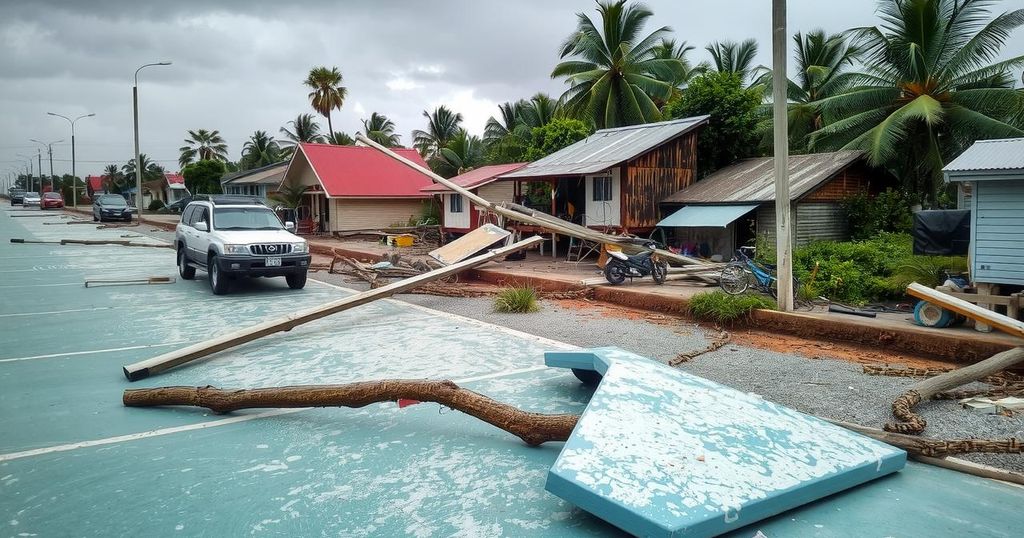Tropical Cyclone Chido: Assessing Impact and Emergency Response in Southern Africa
Tropical Cyclone Chido is impacting Mayotte, the Comoros, and is expected to strike Mozambique, affecting approximately 2.5 million people. While Madagascar reported no immediate damages, assessments continue. Emergency measures are activated in preparation for severe weather, including strong winds and heavy rain, leading to potential flooding and mudslides across affected areas.
Tropical Cyclone Chido, which intensified in the southeastern Indian Ocean, has recently impacted several regions, including Mayotte and the Comoros. The cyclone is predicted to bring severe weather conditions characterized by strong winds and heavy rainfall, elevating the risk of flooding and mudslides across Southern Africa. Approximately 2.5 million people are situated within Chido’s projected path, comprising over 1.7 million in Mozambique, 440,000 in Malawi, and nearly 370,000 in the Comoros. As of 14 December, preliminary assessments in Madagascar indicated no reported damages or casualties following Chido’s near passage. Nevertheless, the Malagasy authorities continue to evaluate the situation, as unsettled weather persists.
In the Comoros, Cyclone Chido has caused damage, particularly in Anjouan, where five houses have reportedly collapsed, leading to temporary relocations of affected individuals. The cyclone is anticipated to make landfall in northern Mozambique on 15 December, with predictions of damaging winds and heavy rains in coastal provinces, potentially reaching inland regions thereafter. The Southern African Development Community (SADC) has alerted regional partners about the anticipated rainfall, foreseeing possibilities of flash floods and mudslides across multiple southern African nations.
Emergency response measures are being activated by various regional and national authorities. In the Comoros, an orange cyclone alert has been issued, while in Mozambique, red alerts for Cabo Delgado and Nampula provinces are in effect. As preparations unfold, agencies such as the Mozambican Red Cross and World Food Programme (WFP) are initiating anticipatory actions and resource prepositioning to support vulnerable communities. Furthermore, Malawi’s Department of Climate Change and Meteorological Services has issued an impact warning for districts within Chido’s trajectory, and operational centers are being established for a coordinated response. As the cyclone advances, the overall focus remains on safeguarding lives and minimizing damage through collaborative efforts and effective planning.
Tropical Cyclone Chido emerged from a tropical depression in the southeastern Indian Ocean and rapidly intensified to reach severe cyclone status. The cyclone poses significant threats to life and infrastructure as it traverses through Southern Africa, impacting populous regions in Mozambique, Malawi, and the Comoros. Historical comparisons suggest that Chido’s wind conditions exceed those of previous notable cyclones, highlighting the urgency for comprehensive emergency preparedness and response strategies across the affected areas. As weather patterns remain volatile, the activation of emergency protocols and coordination of humanitarian responses is critical to mitigate the anticipated impacts effectively.
In summary, Tropical Cyclone Chido poses an imminent threat to millions across Southern Africa, necessitating urgent preparations and readiness among regional authorities. The ongoing assessment of the cyclone’s impact and the execution of tailored emergency responses underscore the commitment to protecting lives and property. Collaboration amongst national agencies and humanitarian partners will be pivotal as communities brace for potential flooding and related hazards. Continuous monitoring and communication will be vital in minimizing the effects of Cyclone Chido as it progresses towards Mozambique and subsequently influences the broader regional context.
Original Source: allafrica.com




Post Comment